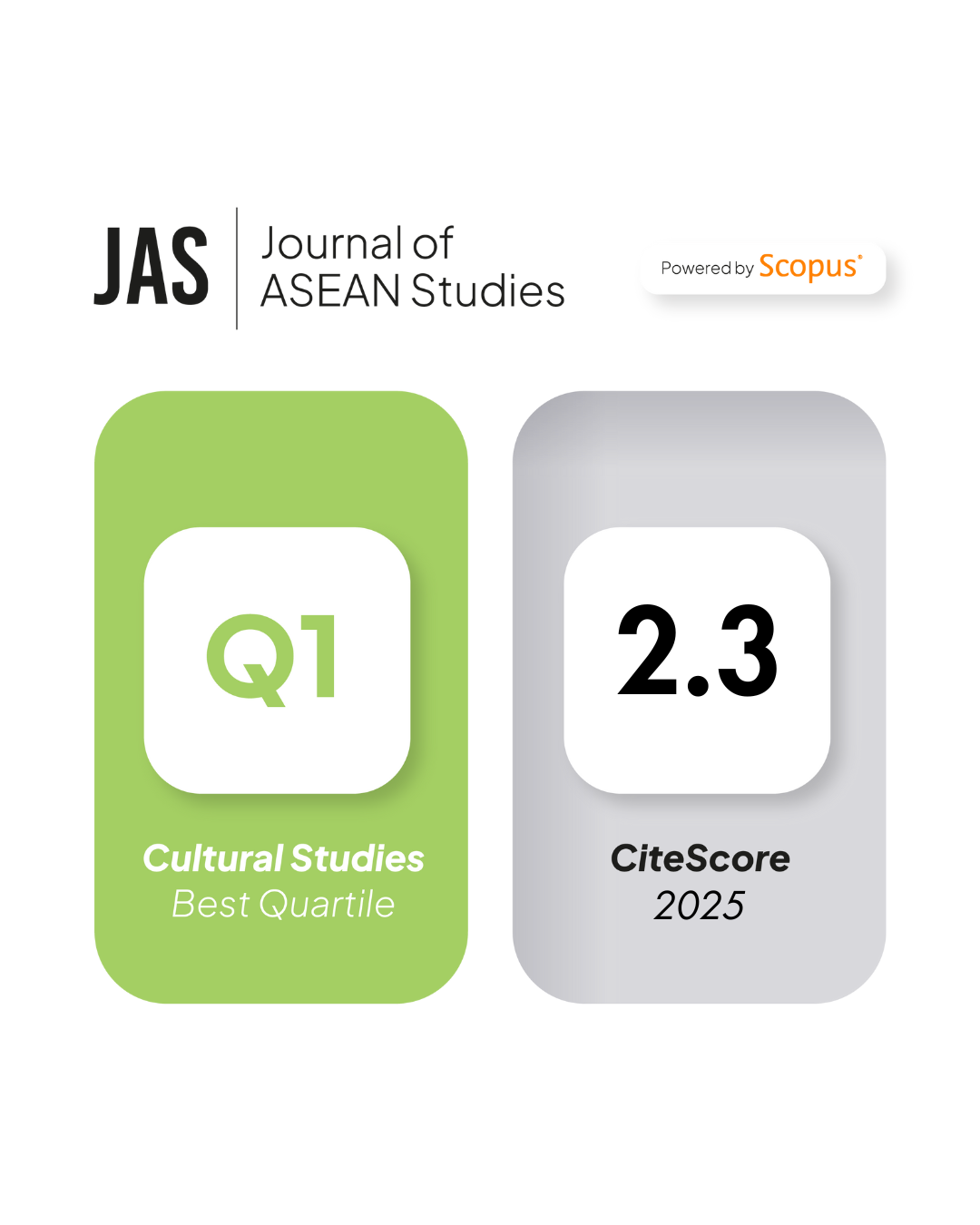The Political Economy of Industrial Development in Thailand
DOI:
https://doi.org/10.21512/jas.v2i2.297Keywords:
Thailand, Regionalization, Localization, Industrial DevelopmentAbstract
Since the 1990s, governments around the world have emphasized the core concepts of globalization. Many governments initiated a series of political policies regarding liberalization and privatization in response to the inevitable phenomenon. In Southeast Asia, Thailand participated in the development as well by reconstructing its financial system to allow greater foreign capital for investments. Unfortunately, the importance of prudential regulations was underestimated, and the neglect thereafter caused the Asian Financial Crisis which initially occurred in Thailand on the second of June, 1997. The Thai government received 17.2 billion US dollars from the International Monetary Fund (IMF) to stabilize its domestic situation and implemented structural reform to minimize losses from the crisis. Meanwhile, different voices regarding the policies for globalization were expressed. These opinions mainly referred to regionalization/ regionalism and localization/ localism. This study discusses how the Thai state transformed under globalization from three industries: the Telecommunication industry, the Automobile industry, and the Cultural Creative industry. This article observes that Thailand turned to take regionalization and localization into consideration, which in turn demanded the state to increase domestic autonomy and capacity. The findings also suggest that cooperation with other governments in the region to accelerate economic recovery from the crisis was inevitable. However, political instability and close state-business relations continue to make the future of Thailand uncertain.
References
Baker, C 2005, 'Pluto-Populism: Thaksin and Popular Politics', in P. Warr (ed), Thailand Beyond The Crisis, Routledge Curzon, London, pp. 107-137.
Busser, R 2008, " 'Detroit of the East'? Industrial Upgrading, Japanese Car Producers and the Development of the Automotive Industry in Thailand", Asia Pacific Business Review, vol.14, no.1, pp.29-45.
Chaksirinont, M 2005, The Effects of Thailand - Australia Free Trade Agreement: A Case Study of Automobile Industry. Master of Economics. Thammasat University, Bangkok.
Doner, RF 1987, Domestic Coalitions and Japanese Auto Firms in Southeast Asia: A Comparative Bargaining Study, Doctor of Philosophy University of California, Berkeley.
Evans, P 1997, "The Eclipse of the State? Reflections on Stateness in an Era of Globalization", World Politics, vol.50, no.1, pp. 62-87.
Evans, P., Rueschemeyer, D. & Skocpol, T. 1985, Bringing the State Back In. Cambridge University Press, Cambridge.
Fuangkajonsak, W 2006, Industrial Policy Options for Developing Countries: The Case of the Automobile Sector in Thailand and Malaysia. Master of Arts. Tufts University.
Hamilton-Hart, N 1999, "Thailand and Globalization", Asian Perspective, vol.23, no.4, pp.287-313.
Hamilton-Hart, N 2000, 'Thailand and Globalization', in SS Kim (ed), East Asia and Globalization, Rowman & Littlefield Publishers, Lanham, pp. 187-207.
Hewison, K 2000, "Resisting Globalization: A Study of Localism in Thailand", The Pacific Review, vol.13, no.2, pp.279-296.
Inside Thailand 2009, Developing Thailand as a Creative Economy Hub in ASEAN, retrieved from http://thailand.prd.go.th/print.php?id=4465&type=inside.
Kesavatana, W 1989, Political Economy of Direct Foreign Investment in Thailand: A Case Study of the Automobile Industry. Doctor of Philosophy. University of Michigan
Ketels, CHM 2003, Thailand's Competitiveness: Key Issues in Five Clusters, Institute for Strategy and Competitiveness, Harvard Business School. Boston.
Lim, LYC & Fong, PE 1991, Foreign Direct Investment and Industrialisation in Malaysia, Singapore, Taiwan and Thailand, Development Centre of the Organisation for Economic Co-operation and Development, Paris.
McCargo, D & Pathmanand, U 2005, The Thaksinization of Thailand, NIAS Press, Copenhagen.
MOEA 2006, Japan's Economic Cooperation Program for Thailand, MOEA, Tokyo.
Montesano, MJ 2007, 'Thailand: A Reckoning with History Begins', in D Singh & LC Salazar (eds), Southeast Asian Affairs 2007, Institute of Southeast Asian Studies, Singapore, pp. 311-338.
Munakata, N 2005, Transforming East Asia: The Evolution of Regional Economic Integration, Research Institute of Economy, Trade and Industry, Tokyo.
Nesadurai, HES 2003a, "Attempting Developmental Regionalism through AFTA: the Domestic Sources of Regional Governance", Third World Quarterly, vol.24, no.2, pp, 235-253.
Nesadurai, HES 2003b, Globalisation, Domestic Politics and Regionalism: The ASEAN Free Trade Area, Routledge, London.
Niyomsilpa, S 2000, The Political Economy of Telecommunications Reforms in Thailand, Pinter, London.
Niyomsilpa, S 2008, 'Industry Globalized: The Automotive Sector.' in P Phongpaichit & C Baker (eds), Thai Capital: After the 1997 Crisis, Silkworm Books, Chiang Mai.
Office of Industrial Economics 2006, Automotive Industry in Thailand, Ministry of Industry, Bangkok.
Pananond, P 1999, "Build on Shaky Ground?: The International Expansion of Thai Telecommunication Firms", paper presented at the 7th International Conference on Thai Studies in Amsterdam.
Pathmanand, U & Baker, C 2008, 'Hello and Goodbye to the Mobile Phone', in P Phongpaichit & C Baker (eds), Thai Capital: After the 1997 Crisis, Silkworm Books, Chiang Mai.
Poapongsakorn, N & Techakanont, K 2008, 'The Development of Automotive Industry Clusters and Production Networks in Thailand', in I Kuroiwa & TM Heng (eds), Production Networks and Industrial Clusters: Integrating Economies in Southeast Asia, Institute of Southeast Asian Studies, Singapore, pp 196-258.
Porter, ME 2003, Thailand's Competitiveness: Creating the Foundations for the Higher Productivity, Institute for Strategy and Competitiveness, Harvard Business School, Boston.
Puntasen, A, Lewnanonchai, W, & Rattanawarinchai, T 2008, 'Aspects of an Enlarged ASEAN: a Perspectives from Thailand', in TV Hoa & C Harvie (eds), Regional Trade in Agreements in Asia, Chelteham: Edward Elgar, pp 79-107.
Takayasu, K & Mori, M 2004, 'The Global Strategies of Japanese Vehicle Assemblers and the Implications for the Thai Automobile Industry', in S Yusuf, MA Altaf & K Nabeshima (eds), Global Production Networking and Technological Change in East Asia, World Bank, Washington D.C., pp. 209-253.
Terdudomtham, T 1997, The Automobile Industry in Thailand. Thailand Development Research Institute Foundation, Bangkok.
Thailand Automotive Institute 2006, Annual Report 2005. Thailand Automotive Institute, Bangkok.
Thailand Development Research Institute 2002, Competition Policy under the New Constitution and the Role of the Government. Thailand Development Research Institute, Bangkok.
Thailand Investment Review 2010. May: 20(5).
Weiss, L 2003, 'Introduction: Bringing Domestic Institutions Back In', in L Weiss (ed), States in the Global Economy: Bringing Domestic Institutions Back In, Cambridge University Press, Cambridge, pp. 1-34.

























